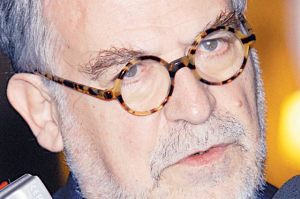Marco Aurélio García vs. Ernesto Villegas

You wouldn’t like Ernesto when he’s mad
One of Brazilian President Dilma Roussef’s top foreign policy advisors, Marco Aurélio García, has gone on the record saying nothing will happen on January 10th, since the government can just call a 90-day “temporary absence” under Article 234 of the Constitution, and could even renew it for a further 90-days if need be.
In fact, Mr. García had better brace for a tongue-lashing from Venezuela’s Information Minister, Ernesto Villegas: although the 90-day “temporary absence” Mr. García refers to may indeed be the least-bad option at this point, it’s also one that the Venezuelan government has vehemently rejected.
So much so that Minister Villegas went out of his way recently to publicly protest against media outlets that refer to Vice-President Maduro as “president in charge”…which is what he would be, if Chávez’s temporary absence under article 234 was in force. Here, Mr. García, is a taste of what Minister Villegas has to say to Venezuelans who go along with your interpretation:
El hecho de que por razones médicas el presidente de la República esté de permiso constitucional, aprobado en forma unánime por la Asamblea Nacional, y haya delegado algunas de sus atribuciones en el vicepresidente, no autoriza a desconocerlo en la titularidad y ejercicio de su cargo.
In a swipe at all Venezuelans, Mr. García said that our transition crisis “needed to be examined in accordance with a political culture and an institutional reality that is different than [Brazil’s].” We suppose that’s a euphemism for “a political culture and an institutional reality marked by outright lawlessness.”
Perhaps Mr. García should read a little more before dipping his toes in other people’s problems.
As Quico pointed out, very red Supreme Tribunal said that taking the oath of office was a “necessary” condition for acts of government to be valid. It called taking the oath an “irreplaceable solemnity,” which clearly refutes the Maduro/Flores position on a magically self-extending, oathless constitutional period.
The same Supreme Tribunal also said that the articles in the Constitution were “explicit” in setting the 10th of January as the date where the oath should take place, and they did not need to be interpreted. They claimed that Chávez taking the oath on August 19th, 2000, was the product of the exceptional circumstance of the Constitution having just been approved.
I don’t know how relevant Mr. García’s endorsement will turn out to be, but the result is the same: he doesn’t know what he’s talking about. He’s not defending democracy. He’s defending his interests.
Caracas Chronicles is 100% reader-supported.
We’ve been able to hang on for 22 years in one of the craziest media landscapes in the world. We’ve seen different media outlets in Venezuela (and abroad) closing shop, something we’re looking to avoid at all costs. Your collaboration goes a long way in helping us weather the storm.
Donate




